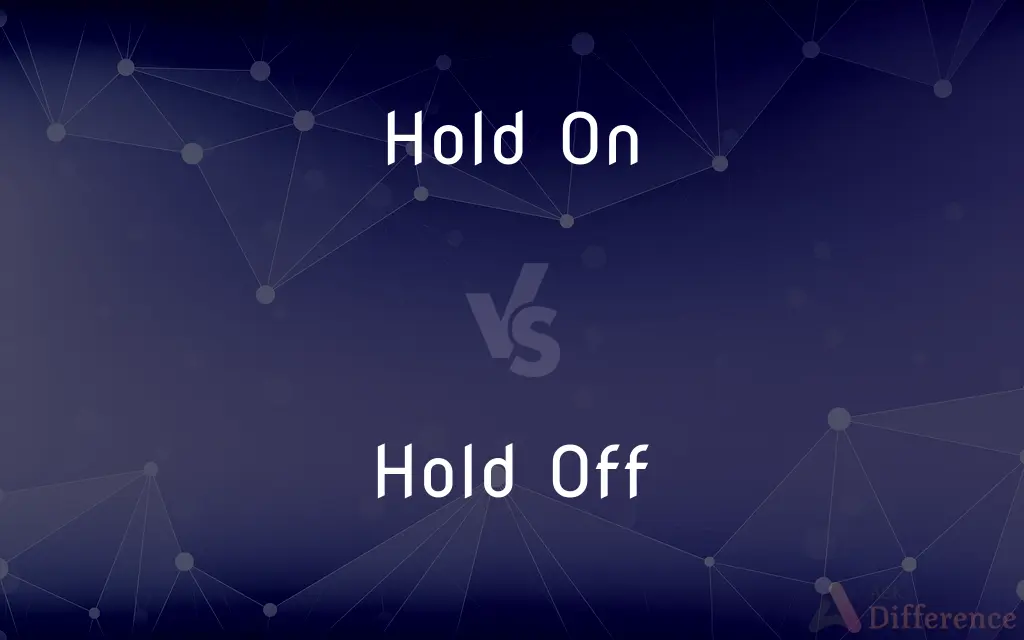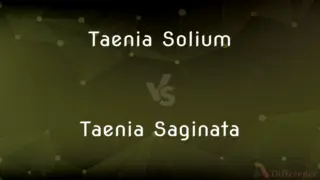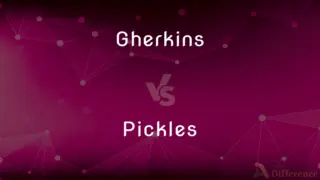Hold On vs. Hold Off — What's the Difference?
By Tayyaba Rehman — Published on November 26, 2023
"Hold on" means to wait or maintain a grip, while "hold off" means to delay something or keep at a distance.

Difference Between Hold On and Hold Off
Table of Contents
ADVERTISEMENT
Key Differences
"Hold On" typically implies a sense of persistence or maintaining a current state. It can refer to physically grasping something or metaphorically clinging to an idea or plan. Conversely, "Hold Off" suggests a delay or a temporary stop to an action or event; it involves postponing decisions or activities.
In communication, when someone says "Hold On," they're asking you to wait for a short time. It's a request for patience, perhaps while they gather their thoughts or retrieve information. "Hold Off," however, is often used when advising someone to delay their actions or decisions, suggesting that it might be beneficial to wait.
"Hold On" can also indicate enduring through challenging times. It's about persistence and not giving up. "Hold Off," in this context, might mean to refrain from engaging with something potentially problematic or delaying something because the timing isn't right or conditions are unfavorable.
In a physical context, to "Hold On" means to keep a firm grip on something, preventing it from moving or falling. On the other hand, to "Hold Off" can mean to keep something or someone at bay or at a safe distance, like in a defensive situation.
Lastly, "Hold On" can imply a sense of anticipation or expectation for something in the near future, while "Hold Off" suggests resistance or a temporary pause, preventing something from happening immediately for various reasons, possibly strategic or due to uncertainty.
ADVERTISEMENT
Comparison Chart
Definition
To wait or grasp tightly.
To delay or postpone.
Usage
Request for patience.
Suggestion to delay.
Context
Persistence, endurance.
Resistance, prevention.
Connotation
Anticipation, expectation.
Caution, restraint.
Physicality
Maintaining a grip.
Keeping something away.
Compare with Definitions
Hold On
Maintain a firm grip
Hold on to the railing as you walk down the stairs.
Hold Off
Cease fire or attack
The troops were ordered to hold off.
Hold On
Keep a telephone connection open
Can you hold on while I transfer your call?
Hold Off
Refrain from acting
Hold off on making any decisions until you have more information.
Hold On
Continue believing in something
Hold on to your dreams, they might come true.
Hold Off
Prevent someone from winning or succeeding
They managed to hold off the competition.
Hold On
Wait for a short time
Hold on for a moment while I find the document.
Hold Off
Delay or postpone
Let's hold off the meeting until next week.
Hold On
Endure or persist
Hold on, better days are coming.
Hold Off
Keep something at a distance
The umbrella holds off the rain.
Common Curiosities
Does "Hold Off" suggest indecision?
Not necessarily. "Hold Off" can be a strategic choice to wait for a more opportune moment rather than indecision.
Can "Hold On" imply emotional support?
Yes, "Hold On" can suggest emotional endurance or clinging to hope or comfort during tough times.
Are "Hold On" and "Hold Off" formal expressions?
Both phrases are commonly used in everyday language and can be appropriate in both formal and informal contexts, depending on their usage.
Can "Hold Off" be used in competitive scenarios?
Yes, it can imply preventing an opponent from advancing or winning.
Can "Hold On" refer to physical actions?
Yes, it often means to physically grasp something tightly.
Can "Hold On" be used in urgent situations?
Yes, "Hold On" can indicate the need to wait momentarily, often used in urgent contexts to imply imminent action or information.
Is "Hold Off" always about delay?
Mostly, "Hold Off" implies a delay or pause, but it can also mean to keep something or someone at a distance.
Is "Hold On" only used in conversations?
No, "Hold On" has various uses, from conversations to describing physical or emotional situations.
Can "Hold Off" mean to cancel something permanently?
No, "Hold Off" typically implies a temporary delay, not a cancellation.
What's a common mistake with "Hold On"?
People often confuse it with "hold up," which can mean to rob or delay, differing from "Hold On's" implication of waiting or grasping.
Can "Hold Off" be used in weather discussions?
Yes, it's often used to describe conditions being kept at bay, like "holding off the rain."
Can "Hold Off" be synonymous with resist?
In some contexts, "Hold Off" can mean to resist an influence, temptation, or attack.
Is "Hold On" used in technological contexts?
Yes, especially in situations like requesting someone to wait on a phone call or during a virtual meeting.
Is "Hold Off" passive in nature?
Not always; it can be an active, strategic choice to delay for a more favorable context.
Does "Hold On" have a sense of immediacy?
Often, it does imply an immediate or imminent action or situation following the pause.
Share Your Discovery

Previous Comparison
Taenia Solium vs. Taenia Saginata
Next Comparison
Gherkins vs. PicklesAuthor Spotlight
Written by
Tayyaba RehmanTayyaba Rehman is a distinguished writer, currently serving as a primary contributor to askdifference.com. As a researcher in semantics and etymology, Tayyaba's passion for the complexity of languages and their distinctions has found a perfect home on the platform. Tayyaba delves into the intricacies of language, distinguishing between commonly confused words and phrases, thereby providing clarity for readers worldwide.














































